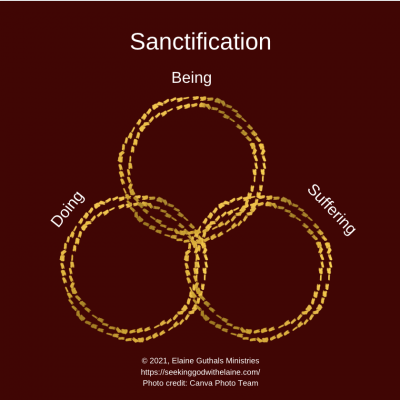Our goal is to navigate the Sanctification Road so that we can become perfected. This daily devotional looks at how Paul admitted to the Philippians that he wasn’t perfect.
Nuggets
- Paul may not have been perfect, but he was working toward it.
- We should only go forward on the Sanctification Road.
- Paul wanted us to get one thing if nothing else — we have to pursue God even after conversion.
Devotions in the Joy in the Gospel series

Paul admitted to the Philippians that he wasn’t perfect. If he wasn’t, how can we be?
Let's Put It into Context
Here is a running list of what we’ve discussed previously.
Admission
“Not that I have already reached the goal or am already perfect, but I make every effort to take hold of it because I also have been taken hold of by Christ Jesus” (Phil. 3: 12 CSB)
Paul may not have been perfect, but he was working toward it.
I forget when it was that we figured out perfection was about being and not doing. That is logical because doing would be earning our way into Heaven.
God says salvation can’t be earned by anything we do. “For by grace you have been saved through faith. And this is not your own doing; it is the gift of God, not a result of works, so that no one may boast” (Eph. 2: 8-9 ESV).
I keep thinking, though, how do we know we’re good enough? That we’ve changed our character enough?
I know we aren’t going to reach perfection here on earth. So, Paul was correct in saying, “Not that I have already reached the goal or am already perfect …” (Phil. 3: 12 CSB).
But how close are we to get in this life?
Watkinson didn’t help. He said that we can’t stick a definition on moral perfection. (Yes, Dictionary Chick is stressing on that.)
Resource
I also know that God does not require that we be successful by our own definitions. That would probably smack of a lot of worldview definitions.
Beecher helped. He noted that this is not a standard that can be measured.
Resource
What God wants is for us to keep going higher and higher on the Sanctification Road. God is looking for our attitude. Are we submissive to Him? Are we even trying to follow Him?
Maybe Woolsey was on to something. He wrote, “The Christian’s feeling is even more painful, when he measures what he has done with what he might or ought to have done.”
Resource
Maybe Paul was evaluating his life because he was thinking that was the end. He saw all his should of, would of, could ofs.
But are those our plans or God’s plans? Yeah, sin makes us do some stupid things. Sins are actions by humans that disobey God and break one of His reasonable, holy, and righteous laws and commandments, goes against a purpose He has for us, or follows Satan’s promptings.
My take on what Woolsey said is we grow as we go along. What satisfied us when we were milk babies does not satisfy us now that we are steak adults.
In other words, we are seeing it through a different lens than we did. We may not see the purpose God had. Remember, His ways are higher and may not be understood (Isa. 55: 8-9).
In plain English, we can’t define moral perfection because His way is higher, but we shouldn’t stress on that.
We’ve got to forgive ourselves of past sin. God has. We’ve got to follow His promptings. That is enough.

Maybe Paul was just in one of his bouts of depression. We think depression is a sin.
I think God wants us to be at least a little depressed that we have broken His laws and commandments. He doesn’t want us to feel cavalier about it.
But we do have to get over it. Woolsey wrote, “There is such a thing as disturbing the balance between the two parts of repentance, sorrow for sin and active obedience.”
Resource
Forgiven sins can’t wreck today’s ministry. Depression over them eats at our foundation. Our foundation has to be peace, love, and mercy.
That depression may begin affecting our character. We can’t let that happen.
Woolsey said that there was a progression we go through.
- Sorrow
- Pass
- Obedience
My first thought was that was a short list of the five levels of grief. But there is an interesting difference.
Pass, to me, is acceptance. So, two of the three levels are us giving God control.
But that isn’t entirely correct, is it? Even in the sorrow we must give God control.

Instead, Beecher said that we should determine what we think God is looking at as the ideal character and work toward it.
Now, my ideal character may be different from your ideal character. Beecher warned us there are many kinds.
At first, I read that and thought, “But there is just one God. We are supposed to imitate all of Him.”
But then, I see that, too. We are called to be different because God gives us different gifts. He gives us different experiences.
Some of us may be strong in faith while others are weak. We just discussed this when we were going through Romans Part II.
To read a related devotion, click the button below.
We must remember that our future relationship with God isn’t dependent on where we’ve been. We’ve said that God is sanctifying us so that we become as He is.

But we must remember God comes to us as we are. We could be a murderer or a liar. He still loves us.
God doesn’t want us to stay there. He wants us to become as He is

How We Head toward Perfection
“Brothers and sisters, I do not consider myself to have taken hold of it. But one thing I do: Forgetting what is behind and reaching forward to what is ahead” (Phil. 3: 13 CSB)
We should only go forward on the Sanctification Road.
God only wants us to remember so that we can see from where He has brought us. He wants us to see success as becoming more like Him.
I would say God wants us to watch and pray more than He wants us to remember.

The past is over and done with. There is nothing — except repent — that we can do about that. Repentance is acknowledging our separation from God and expressing sorrow for breaking God’s laws and commandments by making the commitment to changing ourselves through obedience so that we no longer do the wrong things.
We need to be focused on Jesus’ second coming and eternity. He is coming soon. We need to be ready.
Look what Paul said that he did. “… But one thing I do: Forgetting what is behind and reaching forward to what is ahead” (Phil. 3: 13 CSB).
Watkinson posited that Paul meant he gave up old habits. He let go of what he thought were his failures. He looked to God to be a success.
Resource
When we think about this, we generally think God is wanting us to forget about those attractive sins and those friends who encouraged us to commit them.
We usually don’t think about that it is our having to give up past good works. Insley included that in the list of things to forget.
Resource
We need to do what God calls us to do in His name. That does not always include what the worldview puts great stake in.
Sanctification is based on our growth in our relationship with God. Alexander argued that it, also, is not measurable.
I know we’ve talked about sanctification being a continuum. We would think that could be measurable.
We also wondered if the rings are more a daily exercise. We need to concentrate on doing the daily. That will dictate where it falls on the continuum.

The most important aspect is the growth. If we are not growing, we are telling God that we are not interested in becoming like Him.
The growth only comes by God’s power. There is no checklist we can mark off to make sure we are progressing as required. There is nothing we can do.
It is all God. He does it all for His glory.
Alexander said God is creating new desires, dispositions, and affections in us. We have to aim for perfection.
Pursuing God
“I pursue as my goal the prize promised by God’s heavenly call in Christ Jesus” (Phil. 3: 14 CSB)
Paul wanted us to get one thing if nothing else — we have to pursue God even after conversion.
We have to laser into that. We can’t have divided goals.
Wadsworth put it this way. He wrote, “So is it ever: singleness of aim, oneness of effort — the gathering of thought, feeling, heart, soul, life into one intense absorbing passion — is the secret of all greatness.”
Resource
God and His sanctification of us has to be our priority.

Reading all of this, I keep thinking about how many times we think we are in a rut. We think nothing changes.
Hood argued that is because we keep coming back to where we started. “The sun rises and the sun sets, then hurries around to rise again” (Ecc. 1: 5 NLT).
Resource
This world is going to bog us down. We have to keep the forward progress happening in our souls.
It isn’t physical onward movement. It is changing our character to be like God’s.
Maclaren argued we will still be learning of God as we spend eternity with Him. I can see that.
Resource
Only then will be be like God. We will be spiritual beings instead of sinful beings.
We will be able to understand more. We will see firsthand what God means and wants.

Making the Connections
My Ladies and I call Paul the Energizer Bunny for God. We see him doing all this ministry for God.
It is easy to think Paul was perfect. He wasn’t.
But Paul definitely couldn’t show his insecurities to the Corinthians and probably not to the Galatians.
Paul could get really real to the Philippians. They had a special relationship. He could be himself.
That is good for us. What would we think if we were feeling all these feelings, but we didn’t think Paul had?
We would be biting on ourselves up one side and down the other. We would consider ourselves worthless to God.
But even the consummate preacher of the New Testament felt what we were feeling. God used him and blessed him.
He can do the same for us.
You can probably tell that I liked Woolsey’s sermon. He said something that is really appropriate to our Redo for Godliness series. He wrote, “Forget the past and believe that it is possible for you to grow faster in goodness in one year than you have grown in ten; and that there are resources inconceivably great within your reach.”
Resource
God is the One Who is redoing us. We aren’t.
We think that means God has the resources to do this that we don’t have. I think it is something else.
God has the power to sanctify us.

I have to try to figure out what Watkinson said. He wrote, “That which is not perfect is imperfect; but sin is not imperfection; it is contradiction. The contradictory element was destroyed, but imperfection remained, the normal elements of his nature had not attained their fulness and strength and beauty.”
- We like to think things are opposites.
- Sin is not the opposite of being perfect.
- It is in disagreement with perfection.
- When we come into agreement with God, the stain of the sin is still there.
- It will be there until we are changed at the resurrection of the church.
Resource
How Do We Apply This?
Sanctification isn’t something we can do on our own. We have to let God in His power sanctify us.
That doesn’t mean we don’t have a part. We have to pray that God change us so that we are more like Him.
Lyth said it is our duty to grow our faith. Part of that is denying our current desires, dispositions, and affections.
Resource
We need to put God totally in control.
Father God. Our joy comes from the fact that You are sanctifying us. You are changing us to be like You. May we always follow Your promptings. Amen.
What do you think?
Leave me a comment below (about this or anything else) or head over to my Facebook group for some interactive discussion.
If you don’t understand something and would like further clarification, please contact me.
If you have not signed up for the email daily or weekly providing the link to the devotions and the newsletter, do so below.
If God has used this devotion to speak with you, consider sharing it on social media.